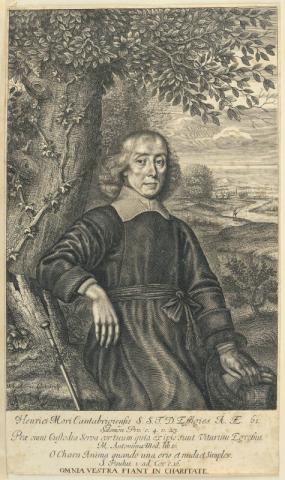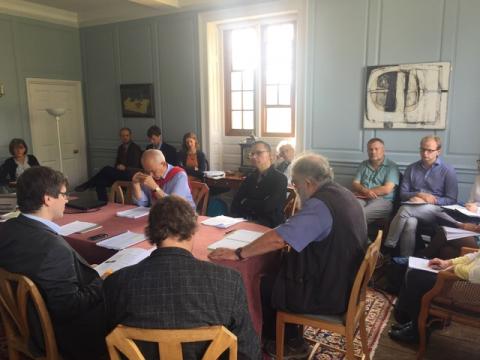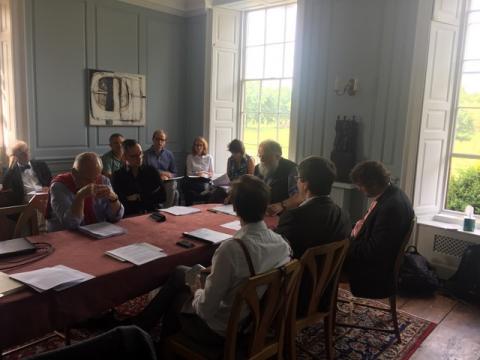
Submitted by Administrator on Thu, 21/06/2018 - 15:12
Workshops on the Latin Works of Henry More I
Concepts of God and Man in Henry More’s Critique of Spinoza
Clare College, Cambridge, 4th June 2018
 The first workshop on the Latin Works of Henry More translated into English for thefirst time on the AHRC-funded project Cambridge Platonism at the Origins of the Enlightenmentwas devoted to first two of the author’s three works directed against the rationalism of Baruch de Spinoza. More’s Ad V.C. Epistola Altera, written in 1677 and published in 1679, is an in-depth refutation of Spinoza’s Theological-Political Treatiseof 1670. The Scholiasubsequently appended to the original work provides a first critical overview of Spinoza’s Opera Posthumaof 1677 as well as a detailed refutation of the materialism and vitalism of Cambridge physician and metaphysician Francis Glisson.
The first workshop on the Latin Works of Henry More translated into English for thefirst time on the AHRC-funded project Cambridge Platonism at the Origins of the Enlightenmentwas devoted to first two of the author’s three works directed against the rationalism of Baruch de Spinoza. More’s Ad V.C. Epistola Altera, written in 1677 and published in 1679, is an in-depth refutation of Spinoza’s Theological-Political Treatiseof 1670. The Scholiasubsequently appended to the original work provides a first critical overview of Spinoza’s Opera Posthumaof 1677 as well as a detailed refutation of the materialism and vitalism of Cambridge physician and metaphysician Francis Glisson.
Benedikt P. Göcke(Bochum) gave an introduction to the contemporary debates on panentheism, stressing the significance of More’s theology of divine space as a daring alternative concept of God. At the centre of the introductory panel discussion was a debate between Prof. Klaus Müller(Münster) and Prof. Douglas Hedley(Cambridge). Whereas Müller espoused a Spinozist view of God and the cosmos, viewed as two irreducible aspects of one reality, Hedley, drawing on Henry More’s critique, insisted upon the indispensability of divine goodness which is abandoned as an unenlightened anthropomorphism in Spinoza’s rationalism. The subsequent discussion revolved around the role of God’s goodness in Spinozism and Cambridge Platonism.
The papers of the workshop dealt with More’s refutation of Spinoza’s Tractatus. Christian Hengstermann(Münster) provided an introductory exposition of the newly-translated work, placing it in the long Anglo-Dutch debate about the relationship of faith and reason in early modern Protestantism and emphasizing More’s commitment to God’s goodness as the first perfection of the ens perfectissimum. Mark Burden(Bristol) addressed the politics of Henry More, as the latter rejected Spinoza’s definition of the natural right as an egotistic striving for self-preservation and advocated religious toleration on the eve of the exclusion crisis. Anders-Christian Jacobsen(Aarhus) outlined the Origenist background of some of the key tenets of the Epistola altera, notably the pre-existence of souls and of Christ. Friedrich Uehlein(Freiburg) and Raimund Litz(Cologne) gave expositions of Spinoza’s religious and moral philosophy. According to Spinoza, religion is not based on reason, but the imagination conceiving of God as an “exemplar of a good life” of charity and justice. Exempt from all moral categories, his omnipotence is the principle of man’s own striving for self-preservation. Jan Rohls(Munich) gave an overview of More’s critique of Dutch collegian and Socinian Frans Kuyper whose fideism of biblical revelation he rejects as wanting, if not quasi-atheistic. Adrian Mihai(Cambridge) and Christian Hengstermann(Münster) discussed Ralph Cudworth’s and More’s critique of panpsychism or “hylozoism”, as espoused by Spinoza and some of his 17thcentury followers like Francis Glisson.
The lively debates of the first workshop on the Latin works of Henry bore testimony to the significance of his critique of Spinoza. A second workshop will take place at the Ruhr University Bochum on 1st December 2018.


